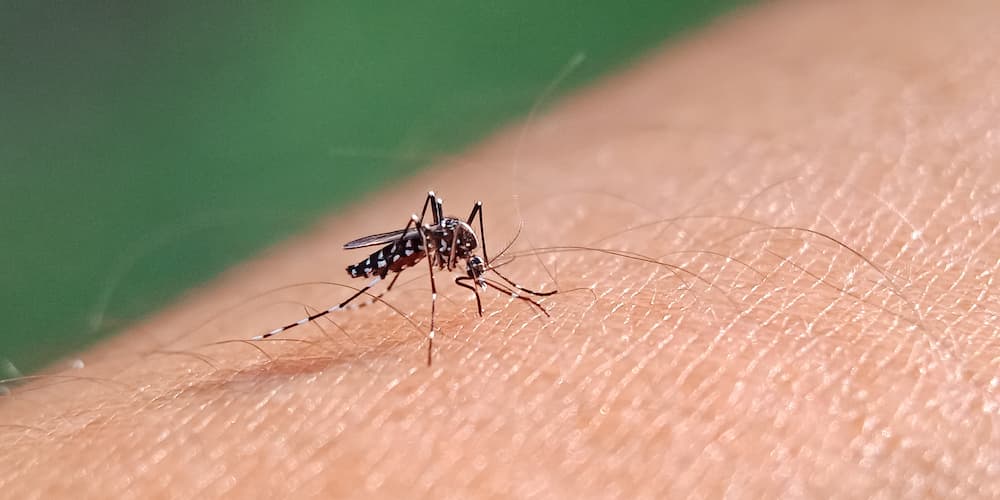
How Long Does a Mosquito Live?
Mosquitoes are both a nuisance and potential carriers of diseases, making it important to understand their behavior and lifespan. The lifespan of a mosquito is a fascinating thing, and we’re taking a look at that today. Our experts at Mosquito Brothers will also cover the most common species found in Long Island, NY, so you can better understand how to cope with these annoying little insects throughout their lives.
Lifespan of Mosquitoes
Understanding the lifespan of mosquitoes can help you identify when they are most active and when they are least likely to be a nuisance in Long Island. It’ll also help you know when to hire the professionals to start spraying. Understanding their lifespan also informs you the how, when, and where to apply control measures.
Average Lifespan of Mosquito Species in Long Island, NY
The lifespan of a mosquito varies significantly depending on the species. The Culex pipiens, or common house mosquito, typically lives between ten days to two weeks. On the other hand, the Aedes aegypti, also known as the yellow fever mosquito, has a lifespan of around two or three weeks under favorable conditions. The Anopheles quadrimaculatus, responsible for transmitting malaria, can live up to a month, provided it escapes predators and manages to find a steady food source.
These estimates are all under optimal conditions, however. Many factors can influence how long a mosquito actually lives, including:
1. Environmental Conditions
The lifespan of mosquitoes is heavily influenced by environmental conditions in Nassau, and Suffolk County. Temperature, humidity, and water availability play a critical role in their survival. Warmer temperatures speed up their development, while cooler temperatures slow it down. A dry environment can significantly impact the ability of mosquitoes to breed, reducing their population.
2. Predators and Natural Enemies
While mosquitoes are predators to us, they, too, have their own adversaries. Birds, bats, dragonflies, and other insects are known to feed on mosquitoes. In their aquatic stage, mosquito larvae also fall prey to fish, frogs, and other aquatic creatures. Even within their own ecosystem, mosquitoes face threats from parasitic fungi and bacteria. These natural predators help regulate the mosquito population, thereby indirectly playing a role in influencing their lifespan.
Behavior After Biting
Most people only know that mosquitoes bite. Like everything else, though, they are complex organisms with their own behaviors. By understanding these insects, you can better handle them when they start buzzing around you.
Here are some mosquito facts that you should know:
Do Mosquitoes Die After Biting?
A common myth is that mosquitoes die after they bite, but this isn’t entirely true. This is likely a confusion with bees, which typically die after stinging. Contrary to popular belief, female mosquitoes can bite multiple times throughout their life if they have access to a blood source. This is because they need the protein found in blood to produce eggs, enduring the process repeatedly throughout their lifespan.
Which Mosquitoes Bite?
Only female mosquitoes bite. As explained earlier, mosquitoes use the protein found in blood for egg production, meaning only the bugs that lay the eggs actually require blood. Male mosquitoes typically ingest nectar from plants.
Post-Bite Behavior of Female Mosquitoes
Once a female mosquito successfully feeds, she will rest for a couple of days before laying her eggs. The location where these eggs are laid varies by species, but water bodies are a popular choice. The eggs will then hatch into larvae in a few days or weeks, depending on the environmental conditions.
After laying eggs, female mosquitoes rest and continue their search for another blood meal. This cycle continues until the end of their lifespan, making their existence a continuous cycle of feeding, resting, egg-laying, and more feeding.
Mosquito Brothers’ Expert Insights
Understanding mosquito behavior and patterns goes beyond just knowing their lifespan. At Mosquito Brothers, we delve deep into understanding their breeding habits, feeding patterns, and preferred habitats to devise effective pest control strategies in Long Island.
Tips for Mosquito Control and Prevention
To keep mosquitoes at bay, ensure your environment is less appealing to them. Dispose of standing water, keep your yard clean, and trim tall grasses regularly. Consider using mosquito repellents and, in severe cases, professional pest control services for effective mosquito management.
Handle Your Mosquito Problem With Mosquito Brothers
The lifespan of mosquitoes varies significantly, influenced by factors like species, environmental conditions, and the presence of predators. These pests are annoying and often carry diseases, making it all the more important to understand them to better get rid of them before they become a problem.
It’s crucial to be proactive and start spraying your property as early as mid-March to prevent a mosquito infestation. With potentially hundreds or thousands of mosquito eggs on your property from the previous year, it’s essential to take action before warmer weather arrives. Especially with a mild winter, Long Island (Nassau and Suffolk County) could see a rise in mosquito populations as the temperature increases. Hiring a professional company like Mosquito Brothers to spray your property early can be highly beneficial in controlling the mosquito population and ensuring a more pleasant outdoor experience for you and your family.
We at Mosquito Brothers are dedicated to sharing our pest-related knowledge to allow you to better understand these pesky creatures and take appropriate control measures. For expert pest control solutions and tailor-made strategies to tackle your mosquito problem, feel free to contact us whenever you need help in Nassau and Suffolk County.
IMG Credit: Niny2405